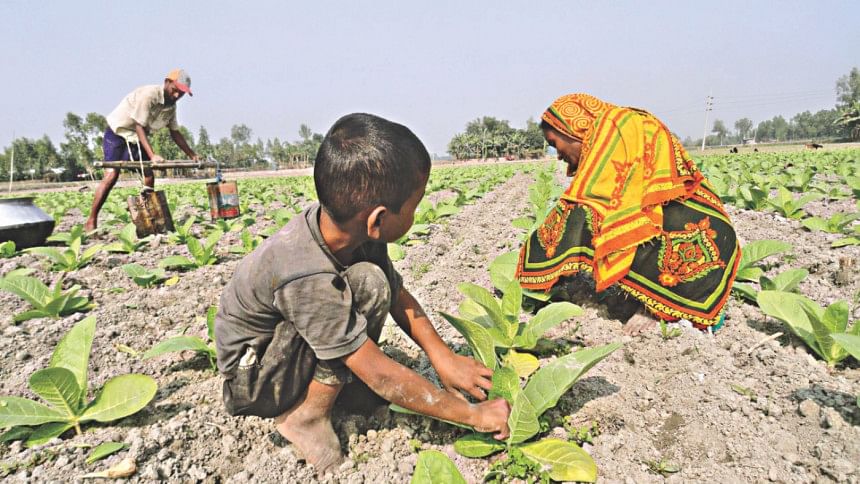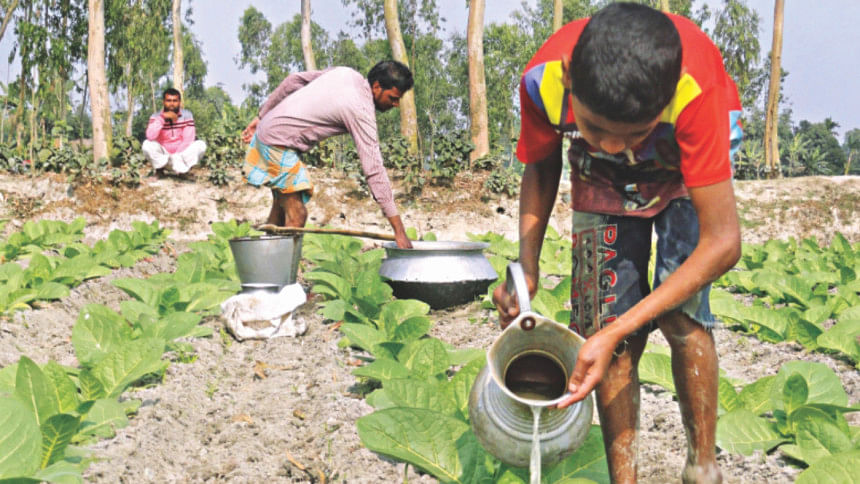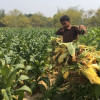Kids trapped in Tobacco Menace

For many struggling Lalmonirhat families, relatively lucrative tobacco farming appears to be a blessing. But cultivating the crop brings significant health consequences. Worse still, with children commonly engaged in tending fields, the health of many youngsters is compromised.
“Our three sons and one daughter help in the tobacco field,” says Afsar Ali, 45, of Aditmari upazila's Saptibari village. “It saves labour costs. But even we adults suffer headaches, cough, fever and pain from working with tobacco. For the children it's really serious.” Ali says he has no viable alternative.
“Working in the field makes me very weak,” says Ali's 12-year-old son Shariful, a student of class-VI. “Sometimes while working I vomit.” Shariful complains tobacco farming makes it more difficult to be attentive in class.
Green tobacco sickness is a health condition caused by dermal absorption of nicotine while working in tobacco fields. Symptoms include weakness, headaches, nausea, vomiting, dizziness, abdominal cramps, breathing difficulties, diarrhoea and chills. The malady can result in blood pressure and heart rate fluctuations. Symptoms usually last for several hours.
Following rain or dewfall when leaves are wet, the risk is the greatest, and children, having no resistance to nicotine, unlike a seasoned smoker may, are especially vulnerable.
Using protective clothing and choosing not to enter the field of wet leaves can minimise risk, but many tobacco farmers are unaware of such measures. Most don't buy gloves; nor is it usual for the tobacco companies which encourage tobacco farming to supply them.
“Sometimes I work in the field every day,” says nine-year-old Reshmi Akter, a student of class-IV in Aditmari upazila. “I can't stay there long.” Akter describes symptoms of facial pain and fever from her tobacco field experience.
“I know it's harmful for health,” says her mother Roksana Begum, 32. “Our 13-year-old son Nur Islam became seriously ill from the field work last year and we had to spend Tk 10,000 on treatment.” Nonetheless she says her family is habituated with tobacco farming.
Other families are more cautious. “I won't allow my son to work full-time in the tobacco field,” says Jobeda Begum of Thakurer Malli village in sadar upazila. Her son Rony Islam studies in class 1. “We know tobacco farming is hazardous and also harms the soil. Sometimes Rony helps, but it's not a permanent arrangement.”
A secondary consequence for children is that they miss classs, particularly in late April when leaves are harvested. The headmaster of Aditmari's Saptibari High School, Tayez Uddin, says the non-attendance of many students during the six months of the cultivating season is a scenario common to tobacco-growing villages.

Still, for impoverished farmers the crop is seen to bring benefits. “We get seeds, fertilisers and pesticides for free from tobacco companies,” says Rony's father Motaleb Ali. “They provide money to build leaf processing structures. Tobacco farming makes our family solvent.”
“I would stop growing tobacco if I got a fair price for other crops,” says neighbour Javed Ali. He has cultivated tobacco on eight bighas of land this year and his son Rasel Islam, a student of class-IV, participates. “Rassel weeds and tends the tobacco,” his father says, “He waters the plants and with his uncle and I, mixes the chemical fertilisers.”
Exposure to fertiliser and pesticide chemicals are further health hazards encountered by the children of tobacco farming families. While many crops rely on similar products, according to the World Health Organisation “large and frequent applications of pesticides” are required to farm tobacco. In Lalmonirhat, tobacco companies provide among others the insecticide virtako, used to target stem borers locally known as “majra poka”. Agriculture officials do not recommend its use to farmers in general.
These chemicals not only reduce long term soil fertility but may pollute groundwater and waterways as well.
Agriculture extension department officials recorded a total of 11,500 hectares in Lalmonirhat devoted this year to tobacco cultivation. They suspect the actual size of tobacco cultivation may be double that.
“It's rapidly increasing,” says agriculture officer Enamul Haque, “Farmers are lured by the tobacco companies. If the extra incentives offered were stopped, the popularity of tobacco must decrease.”
His words are echoed in the views of tobacco farmers. “We tolerate the harm to our health,” says Jolekha Begum of Tiktiki village in sadar upazila, “because of the good profits.”
“If we didn't get facilities from tobacco companies,” agrees neighbour Rasheda Begum, “we wouldn't grow it.”
Lalmonirhat's deputy commissioner Md Habibur Rahman is concerned. “We are trying our level best to discourage tobacco farming,” he says, “But our campaigns never yield good results because farmers are swayed by the monetary incentives of the tobacco companies. Without appropriate legislation, it's not possible to properly address the situation.”
In the meantime, only a small number of farming families reach the decision to prioritise health and education. “I wasn't able to attend classes regularly and my parents were often sick,” says Biplob Chandra Roy, 13, a student of class-VIII at Barabari High School in sadar upazila. “As a result,” says his father Ranjit Roy, “We've decided we won't farm tobacco next year.”

 For all latest news, follow The Daily Star's Google News channel.
For all latest news, follow The Daily Star's Google News channel. 








Comments